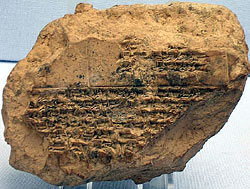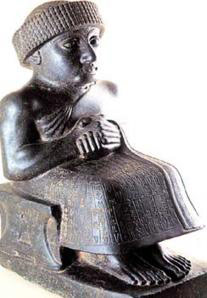
Sun-Earth Day Presents: Eclipse, In a Different Light
Ancient eclipse forecasts, when successful, were a powerful means of divining omens for anxious Kings.
TECHNOLOGY THROUGH TIME ISSUE #32: ANCIENT BABYLON

Babylonian clay tablets (such as the one to the left listing eclipses between 518 and 465 BC) record the earliest total solar eclipse seen in Ugarit on May 3, 1375 BC. Babylonian astrologers kept careful records about celestial happenings including the motions of Mercury, Venus, the Sun, and the Moon on tablets dating from 1700 to 1681 BC. Later records identified a total solar eclipse on July 31, 1063 BC, that "turned day into night," and the famous eclipse of June 15, 763 BC, recorded by Assyrian observers in Nineveh. By carefully noting local lunar and solar eclipses, Babylonian astronomers were eventually able to predict lunar eclipses and -later- solar eclipses with a fair accuracy. Their tool was the so-called Saros-cycle: this is the period of 223 synodic months (or 18 years and 11.3 days) after which lunar and solar eclipses repeat themselves.

According to J.M Steele at Durham University, UK, comparison of 61 solar eclipse predictions made by Babylonian astronomers after 800 BC against modern predictions has revealed that all of the Babylonian predictions relate to events that were visible somewhere on the Earth's surface, however often far away from Babylon. This represents a remarkable achievement. Almost half of the eclipses would have been visible from Babylon if the Sun had been above the horizon at the time of the eclipse.
Lunar eclipses were considered to be particularly evil omens that involved their kings. Since these eclipses could now be predicted in advance, substitute kings could be appointed who would bear the brunt of the gods' wrath. The real king would remain unharmed and the continuity of the state's policy was guaranteed. (The poor man who was appointed as substitute king was killed. In this way, the omen was always right.)
Technology Through Time
ISSUES
- #46: The Magnetic Sun
- #45: Coronagraph
- #44: Einstein
- #43: Coronium
- #42: The Sun - In a Different Light
- #41: Gallery of Drawings
- #40: First Sun Photo
- #39: Solar Spectroscopy
- #38: George Ellery Hale
- #37: Coronal Mass Ejections
- #36: First Corona Descriptions
- #35: First Sunspot Drawing
- #34: Ptolemy
- #33: Ancient Greece
- #32: Ancient Babylon
- #31: Galileo Galilei
Eclipse Fact
A total eclipse can only happen during a new moon.


